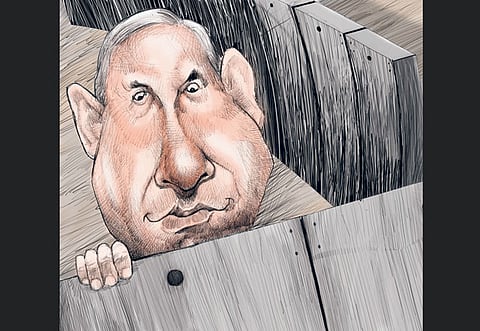Israel needs to look itself in the mirror
It's time to stop building fences as Gazans suffer while Israeli concern for Haiti is praised

The row that took place recently between Israel and Turkey when the Israeli Deputy Foreign Minister Danny Ayalon undiplomatically "rebuked" the Turkish ambassador to Israel during a humiliating encounter over a Turkish television programme critical of Israel reminds me of the saying, "The [black Israeli] pot calls the [shiny Turkish] kettle black."
The Turkish ambassador, Ahmet Oguz Celikkol, was led to a low-level seat in the minister's office while the Israeli deputy foreign minister and a colleague sat on higher chairs.
The coffee table between them had only an Israeli flag on it and his remarks were in Hebrew, a language the ambassador does not know. The Israeli media recorded the event and the photos were circulated worldwide.
After a few tense days, Israel apologised for its outrageous action only after the Ankara government of Prime Minister Recep Tayyip Erdogan threatened to take serious countermeasures.
Relations between Turkey and Israel took a nose dive after Israel's drastic assault on Gaza more than a year ago when 1,400 Palestinians were killed including hundreds of women and children. The Gaza Strip, often described as an open-air prison, is still under siege with no sign that Israel and Egypt would open their borders to the impoverished and densely populated region on the East Mediterranean.
Israel needs to examine itself in the looking glass for its deplorable actions in recent times. Turkey has been a close Muslim ally of Israel for many years, especially in defence matters, and it is said that the Israeli defence industry "depends very much on Turkish orders, about a billion dollars annually".
In fact, despite this "spat", as the Israeli press prefers to call the verbal clash with the Turkish envoy, Israeli Defence Minister Ehud Barak paid a one-day visit last weekend to close this deal which has been in the works for several years.
Shunned
The right-wing Israeli Foreign Minister, Avigdor Lieberman, is known to have insulted many foreign governments including some European, and thereby is shunned by them because they reportedly consider him "a racist or an outright fascist — as, indeed, do most Israelis," writes Uri Avnery, a former Israeli parliamentarian and pacifist.
An editorial in Haaretz, a leading Israeli newspaper, noted recently that "Lieberman's incompetence is forcing the government to find substitutes to carry out his work, lest Israel's foreign policy collapses or becomes limited to ludicrous and brazen rebukes of foreign governments."
If so, why is he still in office? The answer is that his right-wing party, Yisrael Beiteinu, ‘Israel is Our Home', has 15 seats in the Knesset, making it the third largest in the country. And many others believe that Netanyahu is ideologically close to this group.
Turkish feelings against Israel took a sharp about-face after Israel's bloody invasion of the impoverished Gaza Strip, compelling Erdogan to be more hard-hitting, a step that brought him much closer to his neighbouring Arab states Syria, Lebanon and Jordan. As a result, they all agreed recently to eliminate visas for their citizens travelling to each of the three countries. This also brought an immediate sharp rise in Arab visitors from nine countries, reportedly 226 per cent from Saudi Arabia. The consequential drop in Israeli tourists amounted to 300,000 visitors."
The failure of Turkey to win quick membership in the European Union compelled the Ankara regime to turn eastward. Besides exchange visits with his neighbouring Arab states, Erdogan is also this week on a three-day visit to Saudi Arabia where he pledged to boost bilateral trade, which reached nearly $5 billion (Dh18.3 billion) in 2008 but reportedly slowed last year. Speaking before a group of Saudi businessmen, the prime minister again underlined his feelings toward the Palestinian people. "There is nothing more natural than for Turkey to show concern for the Palestinians and Gaza, not because we are Muslim but because we are humans."
Indifference
Much as the Israeli relief contingent has been praised for its work in Haiti after the devastating earthquake here, some Israelis, including Akiva Eldar, a columnist for Haaretz, recalled the calamity that descended on the Gazans.
"Who cares that 80 per cent of the men, women and children living in such proximity to us have fallen under the poverty line? How many Israelis know that a half of all Gazans are dependent on charity, that [the Israeli] Operation Cast Lead created hundreds of amputees, that raw sewage flows from the streets into the sea?"
This Israeli "indifference to the ongoing suffering of the people of Gaza" is only part of the total picture that engulfs the Palestinians in Occupied East Jerusalem and the West Bank where there are incidents like the recent arson attack on a mosque in a Palestinian village had graffiti sprayed by Israeli settlers that read: "Get ready to pay the price" and "We will burn you all."
It's about time for Netanyahu to stop building fences around Israel, as he is now planning on Gaza's southern border, and find a decent way to come to terms with the Palestinians.
George S. Hishmeh is a Washington-based columnist. He can be contacted at ghishmeh@gulfnews.com



